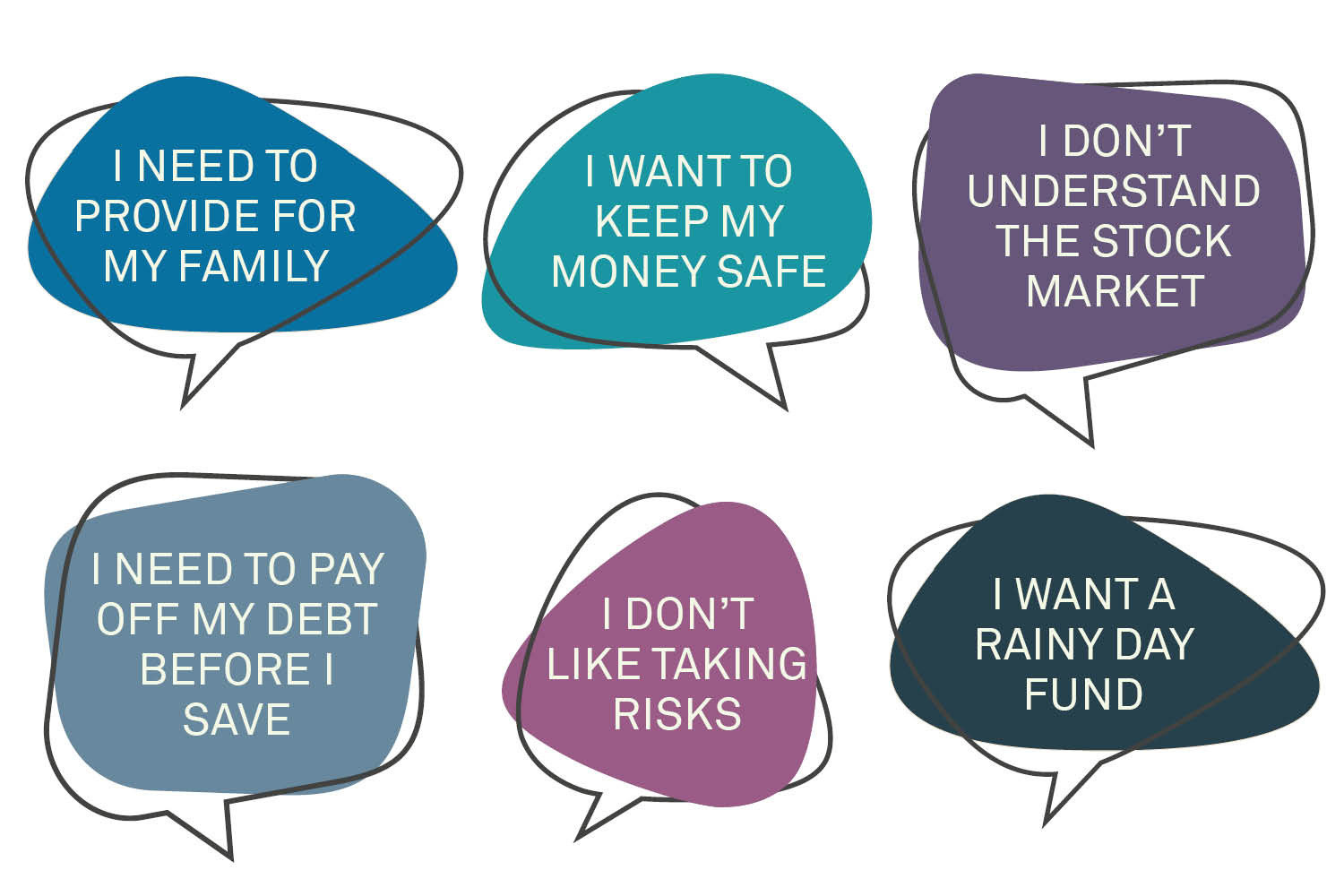What might put people off investing?
Is a lack of knowledge keeping you away from investing? Lucinda Johnson, an Investment Director, explains some of the most common issues to help you get a better grip on the potential for your finances
The value of investments can fall as well as rise and that you may not get back the amount you originally invested.
Nothing in these briefings is intended to constitute advice or a recommendation and you should not take any investment decision based on their content.
Any opinions expressed may change or have already changed.
Published on 23 Feb 20218 minute read

Issues like ‘I don’t understand the stock market’ and ‘I don’t like taking risks’ are common things we hear from clients on an almost daily basis. They are all really valid reasons and really easy to address with a little bit of help and understanding from people like us at Bestinvest.
Don't let sleeping cash lie
Dear old cash is seen as a safer choice when it comes to saving – and rightly so – but there are a few considerations you should make when it comes to planning your finances.
Everyone needs an emergency fund – a good idea is to have enough money in cash to keep you going for at least six months – but interest rates are now at really low levels and they’re unlikely to go up for the foreseeable future, so if your goal is to grow your savings, this may not be the best time to let your cash lie – you really would be eating into your pot.
Also, inflation is eating away at how much you can buy with your money and that is going to have an impact on how much money you’ll have in the future. It may feel safe sitting there if, for example, you put £100 in the bank: in two years’ time you are still going to have £100. But would that £100 still buy you what it bought you two years ago? Probably not.
It’s a lack of understanding of the basics that puts a lot of people off investing, and hopefully going through some of these issues will help get a better grip on that.
Investing 1.1: be a smart learner
Investing is like learning to drive a car. If you’ve never driven a car before, you’re not about to sit in an automobile and head off at 60 miles an hour: everyone would take you for utterly foolish and it would get you in trouble. And investing is the same: if you don’t understand something, you are not going to launch yourself into it. All you need is a bit of guidance and then the benefits could be immense.
It’s really key to know what you’re investing in and what all the different investments are. When approaching investing for the first time, a lot of people ask about the stock market and what is going on in the global financial world, but actually, you should start by thinking about you and what you are trying to achieve.
How much risk are you comfortable taking?
In the financial world, the word ‘risk’ usually describes the range of possible returns on your investment. It is measured by how much an investment can go up or down. Generally, the more often an investment goes up or down, the riskier it is. So the first question to always ask is, how much risk can I afford to take? So, for example, are you going to pay school fees in three years’ time? If you have a short time horizon or a goal – you desperately need a certain amount of money by a certain point – then your willingness and ability to take risks is going to be lower. But with different needs you could stretch that time horizon out and afford to take a little bit more risk.
Please remember that investments can go down in value as well as up and if you only have a short time horizon, you could end up having to get your money out when they have gone down in value and end up with less than you started with.
The second question is, how much risk do you need to take? Is there a goal you are trying to achieve? What is your pot going to look like when you reach retirement? Do you have a figure in your head and how much income you need if, for example, you want to enjoy your holidays? What level of risk do you need to take at each stage to try and get to that pot? When possible, taking on a little bit more risk can help in order to achieve that goal, but it’s always important to remember that the value of your investment can go down as well as up, and you can get back less than you originally invested.
And finally there is: how much risk are you comfortable taking? No matter what your financial goals are, no matter what you want to achieve, there is no point in taking on more risk than you personally feel comfortable with. We all have enough stresses, strains and anxiety in our lives: worrying about your investments shouldn’t be adding to that long list. If you have carefully chosen investments and are taking an amount of risk you’re comfortable with, it really should be a stress-less part of your finances. If you’re too uncomfortable, the answer is: don’t do it.
In terms of the types of investments out there and the sort of risks associated with them: let’s start with the most common ones.
Equities
Lots of people are probably familiar with equities (also known as stocks and shares). These are considered a higher-risk investment. You are buying shares in a company; potentially you could lose everything if that company goes into administration or liquidation. However, your potential upside or profit is theoretically unlimited.
A good side of equities is that companies may pay you a dividend, so you are getting a little bit of income while you are holding that investment: it’s a share of the company profit that is being paid out to you. But it is key to remember that these can go up and down and events beyond companies’ control can affect equities. For example, there’s very little that companies could have done to protect themselves against Covid-19 and many ended up having to cut or cancel their dividends as a result. But it’s important to keep in mind that well-managed companies with good balance sheets and cash flows can survive events like a pandemic. It’s the weaker companies, the ones that are poorly managed and stretched already that could sometimes be damaged beyond repair.
Bonds
Next we have is bonds. These tend to confuse people more than equities do. The trick is to think of a bond like a mortgage in reverse. Rather than you borrowing money from the bank and paying interest on that money, you do the opposite. You loan the money to a company or a government and they pay you an interest rate for borrowing money from you.
What typically happens at the end of the period, be that a long period like a mortgage or a shorter period like five years, is that you get your capital back – and in the meantime you have been receiving that interest payment too. As a result, this is a much lower-risk investment because you are likely to get your capital back. It’s not completely without risk, though; as with equities, the company or government can go bust, and may not be able to pay the loan back. However, bond holders have to be paid back before equity holders, so the risk of losing your full investment is reduced. Because of the lower risk, you tend to get lower returns.
Bonds are like a mortgage in reverse. Rather than you borrowing money from the bank and paying interest on that money, you do the opposite.
Funds
Next stop: funds. Funds are another way to buy shares (or other investments) – instead of buying one piece of a company that you can trade, you give your money to a fund manager who puts it with money from other investors, or ‘pools' it. The manager will then invest that money, buying a number of shares in different companies. They are professionally managed so you’re not making a decision over which company looks good to buy or not or which bond is worth investing in; someone does that for you. Funds allow you to spread your risk across lots of different companies and governments and gives you a chance of investing without putting in huge amounts of money.
Alternatives
And finally, alternatives. They cover everything else in what is known as the investment universe. There are lots of other assets that you can invest in: commercial property, gold, targeted absolute return funds, etc. They can be higher-risk, they can be lower-risk; they really are each in their own category with special features.
So, why should you take an interest in investing?
Compounding is one of the most powerful forces in the universe. What does it actually mean? So, let’s say you invest £10,000 and the market goes up by 5%; you’ve then earned £500. If the market goes up another 5%, you earn the 5% return on the original £10,000 and on the £500 you just earned. So the same 5% market increase means you earn £525. Do this again, and then again, and over a long enough period, it has a huge impact.

The graph illustrates the effect of compounding £10,000 with 5% return over 30 years which takes the investment to nearly £45,000.
We touched on earlier that the cash rates are virtually nothing at the moment and if you are investing in cash you are not getting any benefits of compounding.
What we say is: “It’s about time in, not timing the markets.” It means that instead of trying to time the short-term ups and downs in the stock market, you could be more successful by just investing your money and waiting, so that it might increase over time.
We have an interesting lesson, part of our Beginner's guide to investing, that gives you the pros and cons of investing and cash savings.
Are you ready to get started?
There are plenty of companies with websites that allow you to buy and sell investments easily – they’re sometimes referred to as platforms or brokers, like Bestinvest. Here at Bestinvest you get competitive fees, a knowledgeable telephone team, an abundance of free investment research and control over your investments. It’s quick and easy to open an account with us. Please read the important information below and make sure you understand the risks before investing.
Speak to us
If you’re new to investing and want to understand which the best way to start is, please get in touch by calling our friendly telephone team on 020 7189 2400.
By necessity, this briefing can only provide a short overview and it is essential to seek professional advice before applying the contents of this article. This briefing does not constitute advice nor a recommendation relating to the acquisition or disposal of investments. No responsibility can be taken for any loss arising from action taken or refrained from on the basis of this publication.
Get insights and events via email
Receive the latest updates straight to your inbox.
You may also like…

Investing
Is the government going to change ISA rules? What you need to know

Investing
8 tips to maximise the tax efficiency for your savings and investments this tax year

Investing



